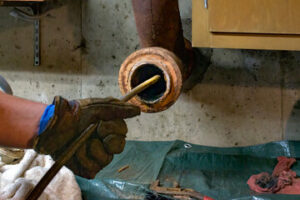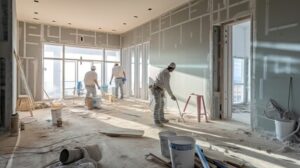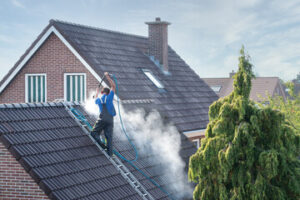Many homeowners and business owners try to prevent drain clogs by practicing good habits like running their garbage disposal frequently, using a plunger or putting baking soda and vinegar down the drain. However, if these DIY solutions are unsuccessful, it may be time to call in professional help.

A professional can use a high-powered water jetting machine to thoroughly clean pipes and prevent nearly all types of blockages from returning. Contact Drain Cleaning Perth now!
Fats, oils and grease (known as FOG) build up on the walls of drain pipes and sewer lines if not properly managed. These substances aren’t water-soluble and will cling to the sides of pipes, creating thick blockages over time. The resulting overflow can lead to sewage backups, flooding and expensive repair bills. Regular drain cleaning can eliminate this risk and promote a healthy plumbing system.
When choosing a drain cleaner for grease, it’s important to select one with specific ingredients that will successfully dissolve the substance and promote free passage through the pipe. Avoid those with harsh chemicals that can pose health risks to users and pets, particularly if they are left undiluted or used incorrectly. Instead, opt for a product that is non-toxic and environmentally friendly and safe to use in conjunction with septic systems.
Another great way to help prevent grease clogs is to install and maintain a p-trap in your kitchen sink. This device captures grease and oil, keeping it away from the rest of your plumbing. Make sure to clean this trap regularly, and change the filter if needed.
There are also several types of drain cleaners for grease that work through a chemical reaction. While these can be effective in some situations, they typically don’t resolve severe or recurring clogs and may require professional intervention.
Lastly, there are biological products that can effectively remove FOG and other organic waste. These products contain live bacteria that eat away at the waste and convert it into water and CO2. While these aren’t as effective as a drain cleaner for grease, they are an excellent choice for preventive maintenance and to keep your drains flowing properly.
If you’re tired of dealing with clogged drains, call your local plumber for a thorough and professional drain cleaning service. A good hydro jetting service can clear even the most stubborn clogs and completely scour your pipes of any debris that is lining them. This ensures that your drains are fully functional and can manage wastewater properly, protecting your home’s plumbing and the environment.
Dish Soap
Many people use liquid dish soap to clean dishes, but this helpful product can also help unclog and clean your drains. This is especially true for grease clogs, which can be caused by food residue, hair, soap scum and more. The chemicals in most dish soaps (and other household cleaners) have the power to dissolve these materials, allowing water to flow freely again.
Often, when a sink or bathtub drain becomes clogged with food residue, grease or hair, it’s because these materials have built up over time. These materials can be broken down with the help of a homemade drain cleaner. One of the most popular DIY drain cleaners is a mixture of baking soda and vinegar. To make this homemade drain cleaner, pour half a cup of baking soda down the affected drain. Follow with an equal amount of vinegar. Plug the drain and wait for about 30 minutes. Next, pour down a pot of boiling water to wash away the mixture and clear your drain.
Another DIY drain cleaner is a simple mixture of liquid dish soap and hot water. This mixture can be used for both food residue and grease clogs. To make this mixture, add a few drops of dish soap to a small amount of hot water. Pour this down the clogged drain and leave it to sit for about an hour. After an hour, pour down a second pot of boiling water to rinse the drain.
While many people swear by this method of cleaning a clogged drain, it’s not ideal for all situations. Using this method to break down a completely blocked drain can be dangerous and could cause more damage than it fixes. If the clog is too severe, it might be necessary to use a professional drain cleaning service.
The best dish soap for drain cleaning is typically one that’s biodegradable, hypoallergenic and contains a low percentage of phthalates, parabens and sodium laureth sulfate. It should also be free of added colors, perfumes and dyes. The Thrive Market dish soap that we tested in our labs fit the bill, but it wasn’t as effective as some other brands we’ve tried. It did have a pleasant, light lavender scent, but it didn’t fight grease very well.
Chemical Cleaners
Chemical drain cleaners come in liquid and powder forms and use a chemical reaction to break down clogs. They are typically used on more stubborn blockages, such as hair or grease. They contain caustic substances like sodium hydroxide (lye) or potassium hydroxide, which generate heat and break down clogs by dissolving fats, oils and hair. Some also contain oxidizers, such as peroxides or nitrates, that release oxygen into the clog to break down organic materials and clear the pipe walls.
These chemical cleaners often require multiple applications to clear even moderately severe clogs. They can also harm your pipes by creating excessive heat or by breaking down the metal components of your plumbing system. They can also be harmful to the environment, disrupting the microorganisms that naturally break down organic waste in waterways.
Most store-bought chemical cleaners are corrosive to the skin and eyes, and can produce toxic gases when mixed with certain metals. They can also degrade plastic pipes, leaving them vulnerable to leaking and cracking. They can also leave unsightly stains on surfaces like countertops and sinks.
The chemicals in these cleaners also take a long time to degrade in water bodies, and can accumulate to toxic levels in the tissues of aquatic animals. This buildup can interrupt natural food chains and destroy entire ecosystems.
If you have a stubborn clog, try to remove it before using chemical cleaners. If you can’t, call a plumber for assistance.
There are safer alternatives to chemical drain cleaners, such as bio or enzyme-based cleaners. These cleaners use good bacteria and concentrated enzymes to break down clogs naturally without the harmful effects of chemicals. They may not be as fast-acting as chemical cleaners, but they are much safer for your pipes and the environment.
Many clogs are caused by problems deeper in the plumbing system, such as misaligned or broken pipes. These clogs can be harder to address, but they can usually be resolved with the help of a professional. A plumber can also use a drain snake, which is a flat-metal rod with a hook on one end, to loosen and pull out most clogs. For more serious clogs, a video camera can be attached to the snake to see exactly where the clog is located and the best way to remove it.
Plumber’s Snake
A plumber’s snake is a long, flexible metal cable with a spring or auger on one end and a handle on the other. It is used to break up and remove obstructions from drains and piping. It is more effective than chemical cleaners, which may damage pipes and the environment.
A plumbing snake can be purchased at most hardware stores. However, you should first prepare the area to make sure it is safe and easy to work in. It is recommended that you wear rubber gloves to prevent bacteria and debris from getting on your hands. You should also clear the area around the drain so you have enough space to move the snake. It is also a good idea to remove the p-trap (the curved pipe under sinks) before you start snaking.
Once you are ready, slowly feed the snake into the clogged drain. The spring or auger will grab onto any material that is blocking the drain and begin breaking it up. Once the clog has been cleared, simply pull the snake back out of the drain.
Be careful when using the snake and always follow the manufacturer’s instructions. You should also thoroughly wash the snake after each use to avoid spreading bacteria or debris to other drains in your home.
Ultimately, the best way to prevent clogged drains is to stop them from happening in the first place. You can do this by reducing the amount of food and fat that goes down the drains, putting food scraps into the garbage, and cleaning out the J- or P-traps under sinks on a regular basis. You can also add strainers to drains and tubs to catch bigger items that could otherwise wash down the drains.
Lastly, it is important to keep water running for at least a minute after you finish washing dishes or taking a shower. This will help reduce the buildup of soap scum, oil, and grease. By following these simple tips, you can reduce the chances of a clogged drain and save yourself from the inconvenience and expense of professional drain cleaning services.


